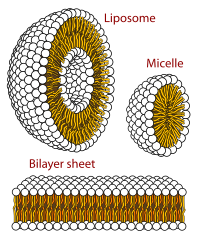
Photo from wikipedia
Cubosomes are a kind of nanoparticle that is distinct from solid particles in that they are liquid crystalline particles formed by self-assembly of a certain surfactant with a current water… Click to show full abstract
Cubosomes are a kind of nanoparticle that is distinct from solid particles in that they are liquid crystalline particles formed by self-assembly of a certain surfactant with a current water ratio. Their unique properties as a result of their microstructure are useful in practical applications. Cubosomes, specifically lyotropic nonlamellar liquid crystalline nanoparticles (LCNs) have gained acceptance as a medication delivery strategy for cancer and other disorders. Cubosomes are produced by the fragmentation of a solid-like phase into smaller particles. Because of its particular microstructure, which is physiologically safe and capable of allowing for the controlled release of solubilized compounds, cubic phase particles are garnering considerable attention. These cubosomes are highly adaptable carriers with promising theranostic efficacy because they can be given orally, topically, or intravenously. Throughout its operation, the drug delivery system regulates the loaded anticancer bioactive's target selectivity and drug release characteristics. This compilation examines recent advances and obstacles in the development and application of cubosomes to treat various cancers, as well as the challenges of turning it into a potential nanotechnological invasion.
Journal Title: Current pharmaceutical biotechnology
Year Published: 2023
Link to full text (if available)
Share on Social Media: Sign Up to like & get
recommendations!